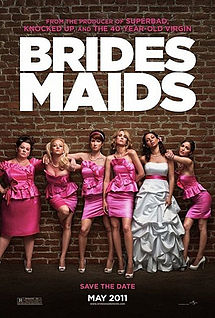It's guest post Monday! Today the lovely and infinitely wise Sierra Godfrey leads us through that dark black part of our manuscript where we go all sadistic on our characters. Fun times!
Over to you, Sierra...
by Sierra Godfrey
In plot structure, one of the hardest moments in a character’s transformative process is the All is Lost point—also called the Dark Moment, or the point about ¾ of the way through the story when after everything our girl has been through, she’s lost. She’s defeated, broken, and there’s nothing left. The All is Lost point comes after the midpoint, and is the point at which our girl will fall, and then ultimately gather herself up and head into the finale where she’ll (ideally) take back the day and win. (The All is Lost moment really applies for any genre of fiction--must apply, really--but in women's fic, it's especially important in our heroine's journey.)
In the movie Bridesmaids, the midpoint of the story comes when main character Annie snaps spectacularly at the bridal shower. She throws things, swears a lot, and makes a massive scene--all in public. Her behavior is the culmination of lots of tension, and she lets it all out. After Annie storms out of the shower, her car’s pesky broken taillight (the one she was told to fix repeatedly) causes an accident and she gets stranded (which is bad). Worse, she calls the only person she can think of, the smarmy guy she was dating/sleeping with, who greets her with possibly the most insulting greeting ever—“Hi F- Buddy!” Worse, he does this right in front of the nice Irish cop Annie’s been sort of dating. Oooh. Ouch.
Cop leaves Annie, and Annie has no choice but to go with smarmy F- Buddy guy. He continues to be obnoxious, and she gets out of his car and has to walk home. It’s the movie’s All is Lost point. Annie has lost her friends, her place in the bridal party (let alone maid of honor position), her car, her Irish cop, even her smarmy her F-Buddy. The next few scenes see Annie really take in the despair of this moment by lying on the couch in misery and watching TV.You need this All is Lost point in a story so your heroine can sink as low as she can go before she can rise again. It’s a natural story dip. Your job is to make this moment as low as possible. Take everything away from your character that you can—everything that matters.
Your All is Lost moment should:
- Feel like the heroine’s lowest emotional point in the whole story—she should die inside a little.
- Be a huge blow to every goal the heroine’s been trying to achieve.
- Happen after the character has resisted hard against every obstacle.
- Take away things from the heroine and leave her bereft.
- In the movie Tangled, Rapunzel and Flynn finally come together and are sharing a loving moment out on a boat. But then Rapunzel’s evil mother tricks her, and takes Rapunzel back in (in a great display of maternal guilt tripping) and Rapunzel is heartbroken and bitter, and has lost her freedom and her love. Flynn is also captured by the mother’s henchmen and tied up in a boat so palace guards will capture him. For both Rapunzel and Flynn, all they’ve fought for has been lost.
- In Pride and Prejudice, the All is Lost point can be hard to pick out. It initially looks like the point after Elizabeth hears the news that her naughty sister Lydia ran off with the equally naughty Mr. Wickham, wreaking general disgrace and havoc on the Bennett family. Elizabeth thinks Lydia’s disgrace will cause Elizabeth to end her acquaintance with Mr. Darcy. But in fact the real All is Lost moment comes when Mr. Darcy’s stink-face aunt, Lady Catherine, visit Elizabeth and tells her to renounce Mr. Darcy and that he’s engaged to her own daughter, Anne. Elizabeth goes for a walk, unable to sleep. Of course, she meets Darcy on that walk, but that walk is your moment. (Austen clearly knew about modern plot structure way back in 1813!)
What are some of the low All is Lost moments you've put your character through?
About Sierra: Sierra has enjoyed crafting stories for as long as she can remember. She especially likes stories that feature women who grow from the choices they face—and get the guy at the end. She’s a member of RWA and lives in the San Francisco Bay Area with her husband, two little boys, and two annoying cats. In her spare time she works as a freelance graphic designer and technical writer. To the untrained eye she can appear somewhat sassy, but at heart she loves a good story and is really quite sweet, especially when the lighting is right. Visit Sierra at her blog or on Twitter.
Sierra has enjoyed crafting stories for as long as she can remember. She especially likes stories that feature women who grow from the choices they face—and get the guy at the end. She’s a member of RWA and lives in the San Francisco Bay Area with her husband, two little boys, and two annoying cats. In her spare time she works as a freelance graphic designer and technical writer. To the untrained eye she can appear somewhat sassy, but at heart she loves a good story and is really quite sweet, especially when the lighting is right. Visit Sierra at her blog or on Twitter.




